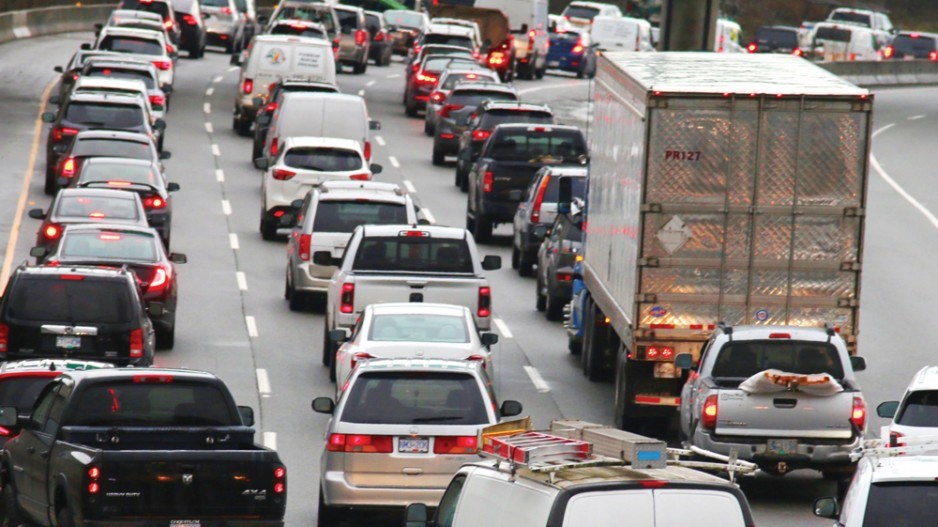Could vehicle levies be on the way to help fund Metro Vancouver transit?
That’s the leading possibility, after the B.C. government revealed Thursday it is preparing to create a totally new funding source for TransLink by 2027 to help provide a stable flow of cash to avoid service reductions.
The surprise news was buried inside an announcement that the province was providing $312 million over the next three years to help avoid massive cuts to bus, SkyTrain and SeaBus service, which were matched by TransLink raising property taxes, parking taxes and various fares.
“In addition, the province has committed, subject to approval of the legislature, to enable additional revenue source(s) in 2027,” read TransLink’s report.
“If passed, the new source(s) is intended to begin in 2027 with full implementation in 2028 generating at least $112 million per year in new revenue when fully implemented.”
There have been three major new transit funding sources floated by mayors in the past decade — two of which are officially off the table.
Mayors have for years wanted a slice of the $3-billion carbon tax to be dedicated to TransLink. But the NDP government eliminated that tax this month.
Another request was for road pricing, or mobility pricing, which could have seen motorists charged for using certain roads, at certain times, to help control congestion and traffic flow. But the government ruled that out Thursday also.
“Our government has been clear that we do not support tolls and are not considering road pricing,” read a statement from the Ministry of Transportation.
That leaves vehicle levies as the last option on the table for new transit revenue.
Ironically, vehicle levies were supposed to be one of the primary funding sources for TransLink when it was founded in 1998 by the then-NDP government.
At the time, transit minister Joy MacPhail signed off on a collaborative way for the province to enforce a vehicle fee to help pay for TransLink. But the measure proved controversial among motorists. And in 2001, then-transportation minister Mike Farnworth killed the idea right before it could be launched.
“'There's no support for it — not from the public, not from their own board members,” Farnworth said at the time. “The public has said loud and clear they don't want it.”
In an ironic flourish, 24 years later, Farnworth finds himself in charge of transportation again. And this time, he may be the one to green light the vehicle levy he rejected so long ago.
“The province has been working with TransLink to analyze a number of options brought forward by the agency and will continue to do so to identify a new tool or tools that can address any remaining operating deficit and enable further expansion,” Farnworth’s ministry said in a statement.
A levy on Metro Vancouver drivers would also make sense from another perspective: It would capture electric vehicle drivers who currently don’t pay any provincial fuel tax.
A slice of the fuel tax goes towards TransLink, but as more people choose EVs, that revenue stream becomes less reliable.
Some provinces have already gone down the vehicle levy road. Alberta levies a $200 annual fee on EV owners to pay for road maintenance. Saskatchewan is raising its fee from $150 to $300 on June 1. Quebec announced this month it will introduce a $125 annual fee in 2027 to help fund road maintenance and public transit.
Energy Minister Adrian Dix has so far resisted suggestions B.C. tax EV owners to help pay for transit.
However, a Metro Vancouver-specific vehicle levy on all vehicles would not only create new TransLink revenue, it would also level the playing field between EV and gas motorists.
The most logical place to administer a new vehicle levy would be when people go to renew their insurance with ICBC. The government has a year or so to iron out the details (and prime the public for the change), before it will have to prepare legislation in advance of 2027.
In other news
• Nurses and health-care workers inside B.C. hospitals are facing rising safety issues, as highlighted by an eye-opening question period at the legislature in which Opposition BC Conservatives read out disturbing real-life stories of physical violence. Columnist Les Leyne weighs in.
• What to do about B.C.’s skyrocketing deficit and debt? Business owner (and former BC Conservative candidate) Yuri Fulmer outlines an interesting four-step process the government could take to jumpstart the economy and reduce the province’s budgetary woes.
• Vancouver’s byelections sent a clear message to the ruling ABC party: The public is unhappy. Columnist Kirk LaPointe has more.
• U.S. softwood lumber duties are going up, and that’s bad news for the province’s already-beleaguered forestry sector. Premier David Eby and Prime Minister Mark Carney spoke about the issue at the legislature this week, with Eby urging more help. Softwood lumber duties have long been a concern in the province, as editorial cartoonist Adrian Raeside has shown over the years.
Rob Shaw has spent more than 17 years covering B.C. politics, now reporting for CHEK News and writing for Glacier Media. He is the co-author of the national bestselling book A Matter of Confidence, host of the weekly podcast Political Capital, and a regular guest on CBC Radio.
🚨New newsletter alert! Stay ahead of the curve in B.C. politics. Get expert political analysis delivered straight to your inbox, plus inside scoops and other stories from across the province.



